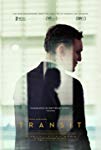Eye For Film >> Movies >> Transit (2018) Film Review
Transit
Reviewed by: Amber Wilkinson

Time and place hold both no and every meaning in Christian Petzold's latest film. Dislocating from the outset, the talk of fleeing fascism and cities being cleansed suggests the Second World War and Nazis to our brains - though they are never mentioned by name - while the modern-day graffiti, sirens and helicopters of Paris and Marseilles tell our eyes we're in the here and now. Although initially disconcerting, this disconnect - or connect, depending on which way you hold it to the light - gradually builds into a mysterious meditation on life in limbo and the pull of both dreams and the real. The end result speaks just as strongly to the situation many find themselves experiencing in Europe today as it does to a brutal period in the past.
In fact, the film is based on German novelist Anna Seghers' 1944 book of the same name, concerning a refugee who has escaped the concentration camps. It seems as though Petzold's protagonist, nameless in the novel but here called Georg (Franz Rogowski), could have almost been haunting the French streets ever since. While Petzold's period pieces Barbara and Phoenix may seem like the most obvious touchstones for his latest, the looping, melancholic sense of déjà vu is most redolent of his metaphysical thriller Yella.

He has a name but otherwise Georg is almost fully stripped of identity, desperate to escape Paris for the port city possibilities of Marseilles, he finds himself in possession of a manuscript and letters belonging to a left-wing writer and soon accidentally acquires the man's identity as well, plus his potential passage on a ship bound for Mexico. Waiting in Marseilles for the relevant paperwork, there's a Kafkaesque feel to proceedings, including the beautiful paradox that he can only stay if he proves that he is about to leave.
Like many tales of refugees stuck on the border - Northless was the one that sprung most readily to my mind - the act of waiting also becomes an act of accretion, to such a point that it is possible to get stuck. Time has little meaning on a day-to-day basis, as Georg eats pizza in a cafe and visits various embassies but he also begins to forge connections, first with the wife (Maryam Zaree) and child (Lilien Batman) of a fallen comrade, and soon a doctor (Godehard Giese) and the mysterious Marie (Paula Beer) who initially seems as though she might just be a figment herself. The sense of multiple stories, looping histories and possibilities is emphasised by a voice-over narrator (Matthias Brandt), who may or may not be any more reliable than anything else we're encountering on screen.
Alongside the film's mysterious thriller element, sits a deep sense of longing, evoked by a central children's lullaby that proves a connection to the past for those who seem unable to move backwards or forwards, and by Talking Heads' hit Road To Nowhere over the end credits. As various people, in various ways, have said down the centuries, history repeats itself because nobody was listening the first time. Georg can tell you all about that.
Reviewed on: 23 Aug 2019

















